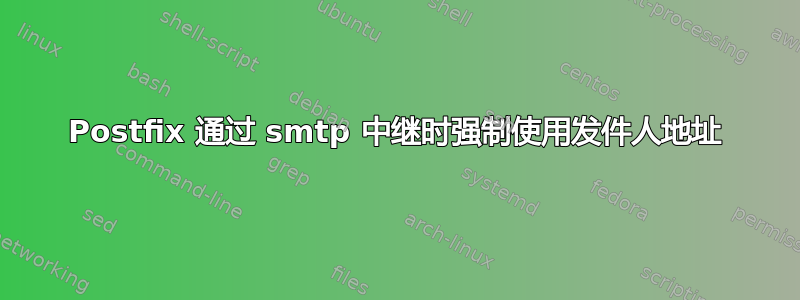
我正在尝试从我们的 AWS EC2 实例获取电子邮件报告。我们正在使用 Exchange Online(Microsoft Online Services 的一部分)。我专门为SMTP 中继,并且我已经设置了 Postfix 以满足通过此服务器中继消息的所有要求。但是,Exchange Online 的 SMTP 服务器将拒绝消息,除非发件人地址与身份验证地址完全匹配(错误消息为550 5.7.1 Client does not have permissions to send as this sender)。
通过仔细配置,我可以设置我的服务以作为此用户发送。但我不太喜欢小心谨慎 - 我宁愿让 postfix 强制执行此问题。有办法吗?
答案1
这是在 Postfix 中真正执行的操作。
此配置更改本地发起和中继 SMTP 邮件流量的发件人地址:
/etc/postfix/main.cf:
sender_canonical_classes = envelope_sender, header_sender
sender_canonical_maps = regexp:/etc/postfix/sender_canonical_maps
smtp_header_checks = regexp:/etc/postfix/header_check
重写来自服务器本身的电子邮件的信封地址
在/etc/postfix/sender_canonical_maps中:
/.+/ [email protected]
重写 SMTP 中继电子邮件中的地址
在/etc/postfix/header_check:
/From:.*/ REPLACE From: [email protected]
例如,如果您使用所有多功能设备和多个应用程序都使用的本地中继 smtp 服务器,那么这非常有用。
如果您使用 Office 365 SMTP 服务器,任何发件人地址与经过身份验证的用户本身的电子邮件不同的邮件都将被拒绝。上述配置可防止这种情况发生。
答案2
可选通用的表指定了从服务器传递(发送)邮件时适用的地址映射。
这与典范映射,当服务器收到邮件时适用。
(注意:对于任何通用表和规范表,FROM 和 TO 地址都可以匹配替换。)
当邮件服务器已接收其他答案已经解释过了。
邮件发送时可以重写发件人地址从服务器发送使用smtp_generic_maps。
根据postfix 文档:
/etc/postfix/main.cf:
smtp_generic_maps = hash:/etc/postfix/generic
/etc/postfix/generic:
[email protected] [email protected]
@localdomain.local [email protected]
然后做:
sudo postmap /etc/postfix/generic
sudo /etc/init.d/postfix reload
参考:
答案3
更新:根据一位 IT 朋友的建议,我在所有服务器上运行 postfix,而不是建立一个云邮件服务器。这是我目前的解决方案:
/etc/postfix/main.cf
# output of hostname -f - mail from local users appears to come from here
myhostname = domU-01-02-03-04-05-06.compute-1.internal
# Local delivery - include all 127.0.0.1 aliases from /etc/hosts
mydestination = $myhostname, $mydomain, rest_of_entries_from_hosts
# Needed for address translation to work
myorigin = $mydomain
# Talking to MS Online
# :submission = port 587
relayhost = [smtp.mail.microsoftonline.com]:submission
smtp_sasl_auth_enable = yes
smtp_sasl_password_maps = hash:/etc/postfix/sasl_passwd
smtp_sasl_security_options = # Yes, leave empty
smtp_tls_security_level = encrypt
smtp_generic_maps = hash:/etc/postfix/generic
# Enable if you need debugging, but it does leak credentials to the log
#debug_peer_level = 2
#debug_peer_list = smtp.mail.microsoftonline.com
# Only listen on the local interfaces (not the public)
inet_interfaces = localhost
# I left out a bunch of CentOS defaults. postconf -n is your friend.
# These are included
alias_maps = hash:/etc/aliases
alias_database = hash:/etc/aliases
/etc/postfix/sasl_passwd
# Run postmap /etc/postfix/sasl_passwd after editing
# Also, chown root:root; chmod 600
smtp.mail.microsoftonline.com [email protected]:YourP@ssw0rd
/etc/postfix/generic
# Run postmap /etc/postfix/generic
# I've seen local mail come from either source
# output of dnsdomainname
@compute-1.internal [email protected]
# output of hostname -f
@domU-01-02-03-04-05-06.compute-1.internal [email protected]
/etc/aliases
# Run newaliases after changing
# Lot of stuff here. Mostly, just make sure the graph points to root, such as
mailer-daemon: postmaster
postmaster: root
# And the important part - your email or distribution group
root: [email protected]
/etc/passwd
# Sometimes it helps to expand the name, so email comes from 'root at aws host 5'
# rather than just 'root'
# Was
#root:x:0:0:root:/root:/bin/bash
# Is
root:x:0:0:root on aws host 5:/root:/bin/bash
我感到高兴的事:
- 许多邮件被发送给 root,其中的一行
alias指示谁收到了它。 - 所有来自本地用户的邮件都被转换为来自
[email protected],因此它会通过 MS Online SMTP 服务器。 - postfix 有比 sendmail 更好的文档。
我不开心的事:
- 每个主机都需要自定义更改,并需要几个步骤。我写了一个 bash 脚本来帮助。
- 名称
passwd技巧并不总是有效,而且很难弄清楚邮件来自哪个服务器。 - 每封发送的邮件都会在日志中留下三个警告:
warning: smtp.mail.microsoftonline.com[65.55.171.153] offered null AUTH mechanism list(SMTP 服务器AUTH在之前发送一个空列表STARTTLS,但AUTH LOGIN在之后)。certificate verification failed for smtp.mail.microsoftonline.com: num=20:unable to get local issuer certificate(证书周围有一些配置选项,但我不确定证书更新时邮件传递是否会中断)certificate verification failed for smtp.mail.microsoftonline.com: num=27:certificate not trusted(同 #2)
感谢 serverfault 社区分享有关邮件服务器的强烈意见。
答案4
与正则表达式相比,一个更简单的答案(根据@Jasper的答案)是使用静态查找:
sender_canonical_maps = static:[email protected]
static总是返回相同的值(https://www.postfix.org/DATABASE_README.html#types)


